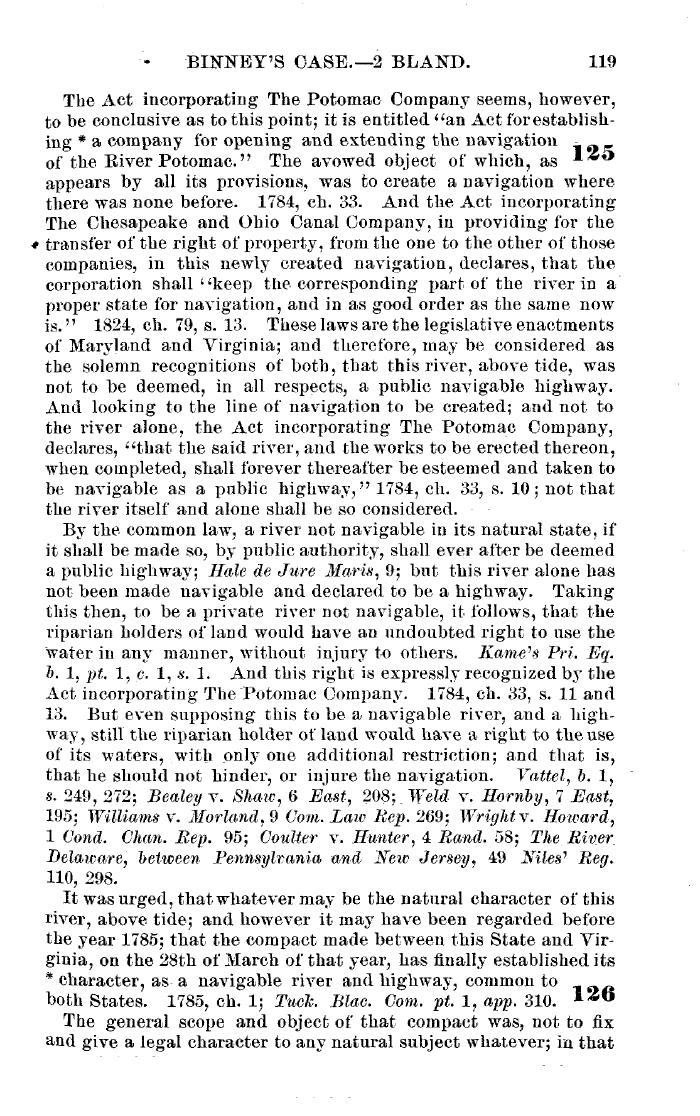|
BINNEY'S CASE.-2 BLAND. 119
The Act incorporating The Potomac- Company seems, however,
to be conclusive as to this point; it is entitled "an Act f'orestablish-
ing * a company for opening and extending the navigation
of the River Potomac." The avowed object of which, as 1
appears by all its provisions, was to create a navigation where
there was none before. 1784, ch. 33. And the Act incorporating
The Chesapeake and Ohio Canal Company, in providing for the
trRn,fer of the right of property, from the one to the other of those
companies, in this newly created navigation, declares, that the
corporation shall « keep tfie. corresponding part of the river in a
proper state for navigation, and in as good order as the same now
is." 1824, ch. 79, s. 13. These laws are the legislative enactments
of Maryland and Virginia; and therefore, may be considered as
the solemn recognitions of both, that this river, above tide, was
not to be deemed, in all respects, a public navigable highway.
And looking to the. line of navigation to be created; and not. to
the river alone, the Act incorporating The. Potomac Company,
declares, "that the said river, and the works to be erected thereon,
when completed, shall forever thereafter be esteemed and taken to
be navigable as a public highway," 1'784, ch. 33, s. 10; not that
the river itself and alone shall be so considered.
By the, common law, a river not navigable in its natural state, if
it shall be made so, by public authority, shall ever after be deemed
a public highway; Hale de Ju.re Maxis, 9; but this river alone has
not been made navigable and declared to be a highway. Taking
this then, to be a private river not navigable, it follows, that the
riparian holders of land would have an undoubted right to use the
water in any manner, without injury to others. liana.e's Pri. Eq.
b. 1, pt. 1, c. 1, s. 1. And this right is expressly recognized by the
Act incorporating The-Potomac Company. 1784, ch. 33, s. 11 and
13. But even supposing this to be a navigable river, and a. high-
way, still the riparian holder of land would have a right to the use
of its waters, with only one additional restriction; and that is,
that he should not hinder, or injure the navigation. Mattel, b. 1,
s. 249, 272; Bealey v. Shaev, 6 East, 20$; Weld v. Hornbg, 7 E447
195; Williams v. 3Iorland, 9 Cona. Laic, Rep. 269; Ilfright v. Howard,
1 Cond. Chan. Rep. 95; Coulter v. Hunter, 4 Rand. 58; The River
Delaware, between Pennsy1rania anal New Jerseg, 49 Mites' Reg.
110, 298.
It was urged, that whatever may be the natural character of this
river, above tide; and however it may have been regarded before
the year 1785; that the compact made between this State and Vir-
ginia, on the 28th of -Aarch of that year, has finally established its
* character, as- a navigable river and highway, common to
both States. 1785, ch. 1; Tuck. Blue. Com. pt. 1, app. 310. 1
The general scope and object of that compact was, not to fix
and give a legal character to any natural subject whatever; in that
|

